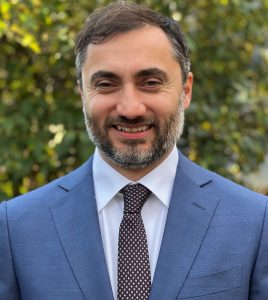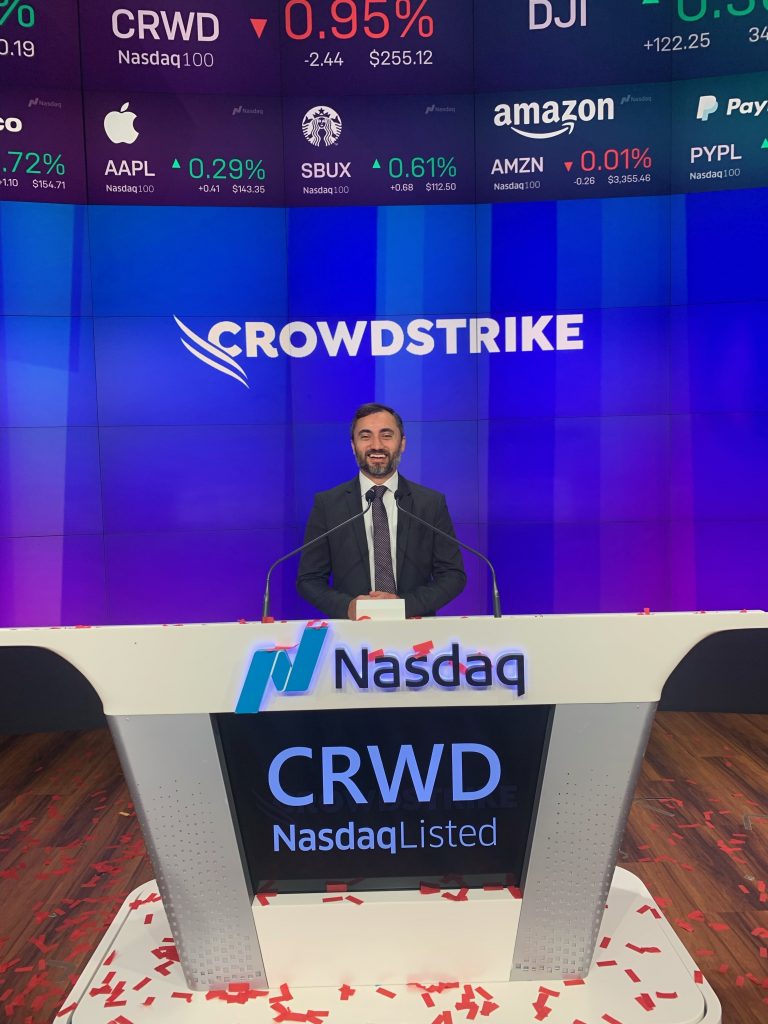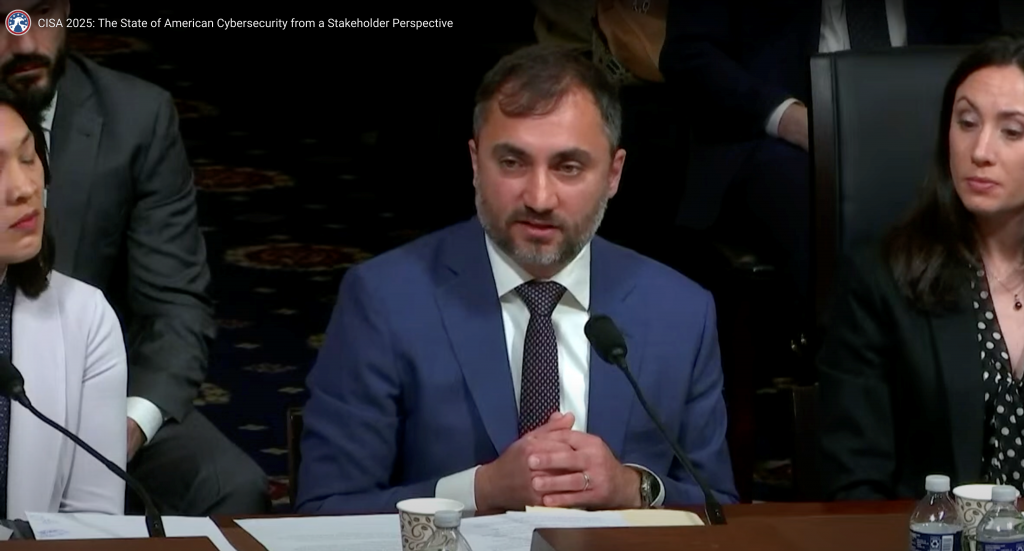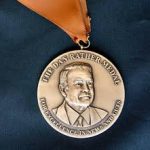PR Alum Combined Love of Law and Technology to Make a Difference in the World of Cybersecurity
By Lenore Devore, B.S. Journalism 1984

Drew Bagley, B.S. Public Relations, B.A. Political Science 2005, M.A. Mass Communication Law 2006, said the pivotal moments in his life started when he was accepted to the University of Florida and continued during his college career.
They led him to his current job as vice president and counsel for Privacy and Cyber Policy for CrowdStrike, which combines the two things he loves – technology and law – and a place on the list of UF’s 2023’ “40 Gators Under 40,” which has honored outstanding young alumni since 2006.
Bagley, who grew up in Winter Springs, Florida, describes the transformative moments in his life as a “choose your own adventure book. Getting into and going to UF was no doubt an incredible transformative moment starting off. I had a Bright Futures scholarship, a strong incentive to go to school in state. UF is obviously the best state school not only in Florida but one of the best in the country. It’s a research institution where all these professors were not just lecturers but leaders in their field. It made the decision easy.”
He started as a political science major, then added public relations in his second semester after a friend told him she was double majoring and working for “a giant in the field,” Telecommunication Department Professor Lynda Lee Kaid, he said.
“I was always interested in all things policy and technology related. I had worked at the Orlando Sentinel in high school for their Rave youth section. I had that exposure to journalism and it was drawing me in.”
And, he needed to make money. Kaid gave him a job analyzing political ads from the 2000 elections and coding them for content analysis. “She eventually gave me the opportunity to be a co-author on a publication with her and eventually several others, and a co-author on book chapters. I ended up working for her for five years and eventually her husband, law school Professor Cliff Jones, as well.”
In his junior year, he took his first graduate-level course, getting his master’s degree one year after earning his bachelor’s degrees. This allowed him to dive into advanced courses about the regulation of modern communication, eventually culminating with his master’s thesis on digital rights management technologies.
The summer after his senior year, he started working for Telecommunication Professor Justin Brown studying the Lifeline federal subsidy program to find out why people who qualified for it weren’t using it. “It was great exposure to focus groups and public policy.”
He also worked on the Marion B. Brechner Citizen Access Project (now Marion B. Brechner First Amendment Project), which compared access laws across the U.S., and he taught Visual Communications. “I was progressing my career while paying for food and rent.”
With three degrees, he wanted to pursue a goal he had since being on the debate team in high school: becoming a lawyer. He earned that degree at the University of Miami (UM) School of Law because it “had a strong focus on being a bit more of a global university and being able to work in a big city like Miami was a unique opportunity.”
After his first year at UM, he interned with the FBI in Washington, D.C. He then worked in its Miami office for two years on counterterrorism investigations while also assisting in the prosecution of health-care fraud cases for the U.S. Attorney’s Office.
Having studied abroad in Rome while at UF, he decided to do a compressed exchange program in Germany while at UM. “The result of that, in part, and with the support of professors, I was one of 10 Americans chosen as an Alexander von Humboldt German Chancellor Fellow. I spent 18 months in Germany, engaged in diplomatic programming, teaching at the University of Leipzig and studying national security and cybersecurity issues. It was another transformative moment.”
And then came another. When he returned home, he went back to work at FBI headquarters for a few years. “It’s where it all came together. I took a chance and left a stable job at the FBI to join a then largely unknown startup, CrowdStrike – the third attorney and one of a little over 100 employees. [CrowdStrike is a leading cybersecurity company, offering a sophisticated platform to help prevent data breaches]. In the past decade, I’ve been helping to build the company and building out the privacy and public policy functions that I run. Now, we have more than 7,000 employees and we are a public company with a global footprint.”

At CrowdStrike, Bagley leads data protection initiatives, privacy strategy and global policy engagement. He serves as CrowdStrike’s representative to the Joint Cyber Defense Collaborative at the Cybersecurity and Infrastructure Security Agency (CISA), an agency of the Department of Homeland Security. He’s an adviser on the Europol Advisory Group on Internet Security, a member of the U.S. Department of State’s International Digital Economy and Telecommunication Advisory Committee, and on the DNS Abuse Institute’s Advisory Council. He is on the faculty of American University, where he teaches cyber law and policy.
In March 2023, he testified before a Congressional subcommittee on the topic of federal cybersecurity.
“The focus of the hearing was on how the federal government is doing with cybersecurity now that the CISA has had more funding and been given more authority in recent years. I was representing a stakeholder view on what that’s like from the perspective of a company that partners with CISA in many ways, as well as providing advice on how the federal government can improve its own cybersecurity and the cybersecurity of the country.”

He thinks his time working on internet governance was part of the reason he was selected to the “40 Gators Under 40” list.
“It’s very rewarding to help work on the policies that help run the internet domain name system,” which he called the phone book for the internet. Years ago, the U.S. government, which created the Internet Domain Name System, spun off control of the system to the non-profit Internet Corporation for Assigned Names and Numbers.
“Internet-infrastructure companies, governments, academics, and other stakeholders are part of the group – it’s a unique global community,” he said. “They meet around the globe every three months and work on protocols and policies. A lot of work I did was focused on analyzing problems with the status quo and recommending cybersecurity policy changes to the ICANN Board to reduce the use of domain names for cyber attacks.”
He visited UF a year ago with his wife, Marni (Coccaro), B.S. Advertising 2003, who he met while at UF, and their two children and reminisced about the commencement speaker at his graduation, CJC alum Eric Wishnie, B.S. Telecommunication 1984, Hall of Fame 2005, who at the time was a producer for NBC Nightly News.
“His words have always resonated with me. His mantra was to remember to say ‘yes’ a lot and have a little faith. At the beginning of his career, when he was working as a page at NBC, somebody was looking for someone to edit video. He had no idea how, but he assumed if he said ‘yes’ he could figure it out and have a little faith in himself.”
His advice to students today? “It’s incredibly important to remember that knowing how to communicate effectively will get you so far in your career, no matter what you do. So you can think outside the box in terms of what you do after your CJC experience. Those communication skills you learned in the college will be critical throughout the rest of your career.”
Category: Alumni News, Alumni Profiles, College News
Tagged: 40 Gators Under 40 CrowdStrike Drew Bagley
Subscribe to our News Digest


